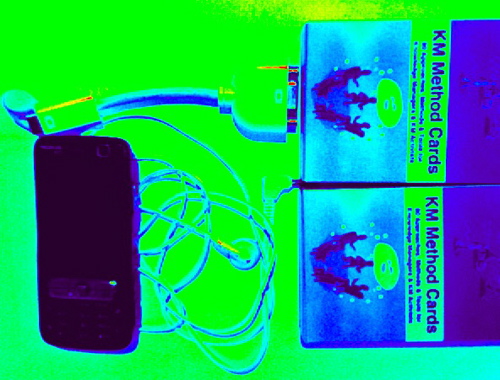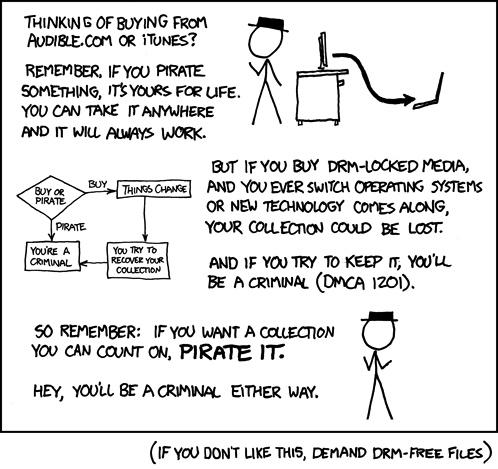Oct 31
A Word from the Wise
I was sorry to have missed the actKM conference this year, but thanks to Matt Moore, we have some of the sounds from that venerable affair (they had a capuccino machine!).
Matt asked Mark, David, Arthur, Graham, Keith and Cory for their words of advice to new knowledge managers and kindly created a podcast. Here are the highlights:
- Don’t try to boil the ocean, focus on 2-3 things that help the business (Mark Schenk)
- Try to find small things that make a big difference (Mark Schenk)
- Don’t do things that other people can do (Mark Schenk)
- Focus on addressing business problems, don’t get distracted by the KM theory (David Gurteen)
- Find someone in management who cares, and then give them successes that make them look a hero (Arthur Shelley)
- Define your KM activities into a project and break it down into bite sized pieces (Graham Durant-Law)
- Be prepared to evolve, start small, and grow (Graham Durant-Law)
- Start in the middle (ie in an area of the operations) and grow it outwards (Keith De La Rue)
- Discover the KM-friendly activities that are already happening and work with them (Cory Banks)
Oct 30
Matt and Dave
Matt Moore and Dave Snowden have been having a scrap (read the comments) about politeness. It just seems a little incongruous. Neither eminence is well known for being troubled by such petty interferences with direct, startling and insightful expression.
So assuming it isn’t some elaborately staged (or improvised) joke here you have two people who have a very high regard for each other rubbing each other up in entirely the wrong way, and in consequence the original question for discussion posed by Matt (some sweeping advice by Dave Snowden at the actKM conference about what knowledge managers should focus on) gets entirely lost in the sound and the fury that ensues. Clearly, if it isn’t a joke, recourse to “politeness” among people who are naturally provocative is a proxy for “I’m feeling prickly today”.
I happen to think Matt asked a great question, one that many knowledge managers probably ask in their own heads but don’t dare speak out. It’s asking for some detailed examples that would help knowledge managers follow the advice. But it was posed provocatively and the hackles have been raised. Politeness is in the air. The intent of the question is lost.
Oh well. Sometimes it is just a bad hair day, and despite everyone’s best efforts, you’re not going to fix a disagreement or get to explore what you wanted to. I have found that forgetfulness is a great friend in such circumstances.
I wondered about blogging this. And I thought actually this happens all the time in KM and we never acknowledge it. Sometimes people just rub each other up the wrong way, or understand things in ways we never intended, and things don’t go rationally. Sometimes you’ve just got to go home, watch a mindless movie, reset your brain and start again the next day as if nothing ever happened.
Politeness, though… that’s a really good one.
Oct 28
On Travelling with KM Method Cards
For those of you who plan to travel by air with our KM Method Cards (who wouldn’t?) you might want to think twice about packing them like this:

Oct 27
On Not Fitting In
 When I was in Columbus for the iCKM conference last week, I went to see a doctor. I had been traveling for almost a week with a bad sinus problem that had started relatively benignly in Singapore and then worsened rapidly as I travelled.
When I was in Columbus for the iCKM conference last week, I went to see a doctor. I had been traveling for almost a week with a bad sinus problem that had started relatively benignly in Singapore and then worsened rapidly as I travelled.
For those of you who’ve had it, sinusitis + air travel = exploding head every time you make a descent. And I had been making a lot of descents. The other interesting effect was that it appeared to send jetlag effects into hyperdrive. So for the curious the formula looks something like this:
Sinusitis + airtravel = (Exploding head x # descents) + (jetlag effects x # hours time difference)2
I wasn’t keen to repeat the experience on the journey back to Singapore. The hotel suggested the nearby public hospital, but the only way to get attention as a walk-in patient was to go to Emergency and I couldn’t in conscience warrant that. The hospital suggested an “urgent care” centre at a local health centre, which does take walk-ins. So I walked in.
Oct 25
Professionalism in Knowledge Management
Yesterday I keynoted at iCKM in Columbus Ohio on “Accountability, Professionalism and Performance in Knowledge Management”. I drew a fairly bleak conclusion on all three elements as they are inextricably linked:
- Accountability – there is none
- Professionalism – we don’t know what it means
- Performance – we don’t know what it would look like
Ed Dale has done a pretty good job of summarising my main points.
Here are the session slides. I referred in the speech to the podcast interview with Dave Snowden and Larry Prusak, which is here, with a good session transcript guide linked here. I also presented the North American data from our iKMS survey on how much organisations seem to be investing in KM capabilities, and the full data tables from that survey are given together with a video speech on a related topic given last year here.
I didn’t end on a completely bleak note, nor do I agree that KM is dead (I seem to have given some participants that impression). In the last couple of slides I do look at some of the constructive things we can do (and are doing in Singapore) to break out of the viciously short non-learning cycles that knowledge managers go through.
Oct 20
When Can You Trust a Knowledge Manager?
If its a tough job being a knowledge manager, it’s an even tougher job to trust them with your organisation’s culture and infrastructure. A survey we conducted last year for iKMS found that most knowledge managers are teleported into their jobs from somewhere else, have very little prior knowledge or expertise in KM, get precious little training and development, and move on to something else within a year or two.
Of course, they could be appointed into that role because of some skill or competency they bring from somewhere else, so this state of affairs is not necessarily a disaster (and we know lots of good teleported knowledge managers) but it does impose incredible strains on these people as they struggle to get to grips with their responsibilities, new frameworks and approaches, and the complex political demands of a KM initiative.
Absolutely the most dangerous knowledge managers are the confident ones in their second KM jobs with a “success” under their belt. They are dangerous because they have typically been appointed on the back of their prior success, and they very often believe that this success represents the correct formula for KM implementation and it bears repeating. Again and again. It doesn’t of course, except by sheer random chance.
KM needs are highly context-sensitive, and even apparently similar organisations respond differently and function differently under the surface similarity. Business needs almost always differ. So while you can repeat the use of guiding frameworks and techniques across different organisations, the content of your implementation will be repeated at your peril. Danger signals here are the use of the phrase “When I was at… we…”. If you hear that from your knowledge managers, sack them. Immediately.
You can start to trust your knowledge managers when they are into their third or more role, when they have sat with a KM implementation for three or more years, and when they have several failures to talk about in a reflective way. Ie they are not burned out or depressed or too afraid to try anything but they are evidently observant, reflective, and ask lots of questions about what goes on in your organisation. And they experiment. When you talk to these knowledge managers about their past job roles, you will be struck by the diversity of their experience and the approaches they have taken, and the things they want to try. They are hungry to continue learning.
Then there are the “naturals”. These are the rare beasts who have a way of tuning into an organisation and reading it at the functional, political and cultural levels almost intuitively. These are the people who seem confident and inspire confidence but work hard at sustaining that confidence with results. So even if it’s only their first or second KM role, they have somehow already got those hard earned habits of their more battle-scarred seniors – they are watchful, reflective, questioning, they make a genuine effort to understand, and they manage risk while not being afraid of failure or discouraged by slow progress.
How do you know if someone is potentially a “natural”? One good sign is that the ratio of questions to answers is always greater than 1; another is they are pragmatic – they naturally zoom into the business goals, and don’t get overly distracted by the KM theory, fancy language or a neurotic preoccupation with “correct” process.

Oct 17
Columbus Courier Call
I’m going to be speaking on professionalism in KM at the iCKM Conference in Columbus Ohio next week. Give me a shout if you are going to be there and would like to meet, and especially if you want me to bring along postage-free copies of my Taxonomy Book, the KM Method Cards, the KM Approaches Methods and Tools book, or the iKMS KM Competency Framework!
Goodness, when did KM stop being about intangibles?
Oct 17
Method Cards in Israel!
There is quite a strong body of KM practitioners in Israel, and they have been playing with the KM Method Cards to take a ground up approach to developing KM programmes, as Yigal Chamish reports:
“Each team (2-3 people) got several random cards of Approaches, Methods and Tools.
· Each team had to focus on a practical and real organisational need which will be supported by KM
· Each team had to develop a KM program to meet the need by choosing/using the Approaches, Methods and Tools given.
· Then, each team presented their program in front of colleagues for review and ideasPeople were interested in participating and enthusiastic using the cards, and responses were positive and demonstrate satisfaction – the cards did come across as relevant to actual organisational life and need.”
Obviously you don’t want to force fit the approaches and methods to meet a need, so I guess this exercise (and the similar “Dominoes” version from Matt Moore the other day) is really helping people become aware of the variety of ways they can approach a KM need. What interests me so far in the examples of use we’re collecting is that the cards function as a focus for conversation, dialogue and learning as much as for brainstorming and planning. Ie they help people reach a shared understanding about what they should be doing in KM.
Here’s a picture of Yigal’s workshop in progress.

Oct 16
Why Piracy Pays
Something to think about from Randall Munroe, not unconnected to Peter Galison’s recent essay on the high cost of secrecy in the book Agnotology.

Oct 16
Juicy
I’m a big fan of Nathan Wallace, the “let’s turn our intranet into a wiki” guy. He has just blogged about Juice, the initiative that won his team a Gold award in the Business Solutions category of StepTwo’s 2008 Intranet Innovation Awards. It seems simple enough: supplying new hires at his company with ICT equipment kits. But in true Wallace style, his team stepped beyond the procedural and aimed for transparency, user control balanced with accountability and outcomes that support the business and the internal client:
“The first impression on new starters for IT and the business as a whole has been transformed. On their first day we can now hand them a computer, mobile phone, mobile broadband, etc all configured and in working order. This truly shows that we are an efficient, organised company who value your arrival and expect you to be productive. In feedback to HR, basic logistics has gone from the number one frustration of new users to the item they are most likely to raise as unprompted positive feedback. For managers, the new starter process now requires no forms and works well regardless of the managers proactivity or experience in onboarding. This is a huge relief and reduced burden on their time.”
Now this isn’t really knowledge management, but knowledge managers could learn a lot from the Wallace approach, particularly with the key realisation early on that the IT Department needed to separate procurement (read, acquiring and implementing a KM system) from fulfilment (read, knowledge workers being happier, more productive and collaborative in their work) – and that they needed to focus much more on the fulfilment end to reach their objectives. Read the full case and examine your consciences.
